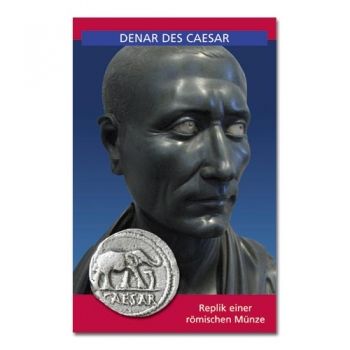Denarius of Caesar - Roman Coins Replica
Denarius of Caesar
Obverse: Priestly attributes referring to Caesar's office as Supreme Priest (Latin Pontifex Maximus). From left: Simpuvium (sacrificial bowl), Aspergillum (holy duster), Securis (axe), Apex (priest's cap).
Reverse: An elephant trampling a dragon or a snake (as a symbol of evil par excellence) could refer to his fight with Pompey, whom he defeated at Pharsalus in 48 BC.
Minted in 49/48 BC at a mint that moved with Caesar.
Material: Pewter alloy with patination.
All coin replicas were cast from originals. They are available individually or in various sets.
Prices handed down for the 1st and 2nd century
1 aureus = 25 denarii,
1 denarius = 25 sestertii,
1 sestertius = 2 dupondii,
1 Dupondius = 2 Ass.
A pig costs 75 denarii
"Pecunia non olet!" - Money does not stink
Emperor Vespasian had taken over from his predecessor Nero a state that was almost bankrupt.
Vespasian reorganised the public budgets with great success. His ingenuity in increasing state revenues was great. Among other things, he introduced a tax on public latrines. When his son Titus objected to this, he held some coins from the tax revenue under his nose and asked if this smell bothered him. Titus had to concede that the money did not stink: Pecunia non olet.
The saying has persisted to this day to justify the possession of money from dubious sources of revenue. The public toilets in Paris are still called "Vespasienne" today. In Italy, too, the public toilets are called "Vespasiani".

